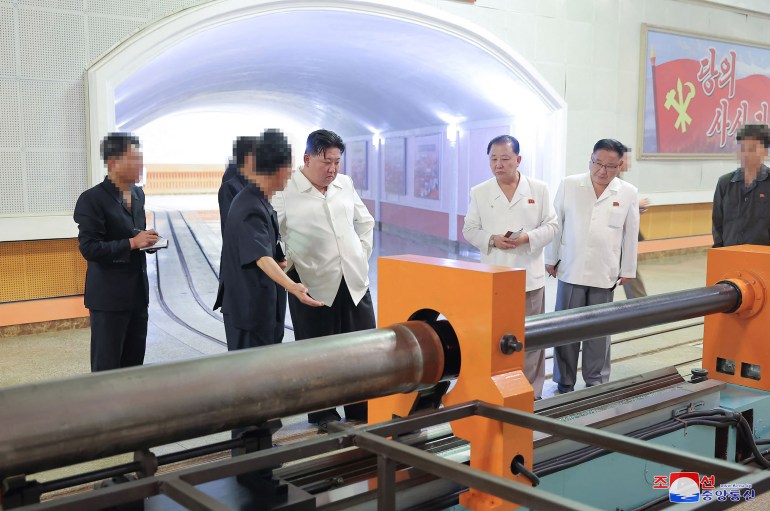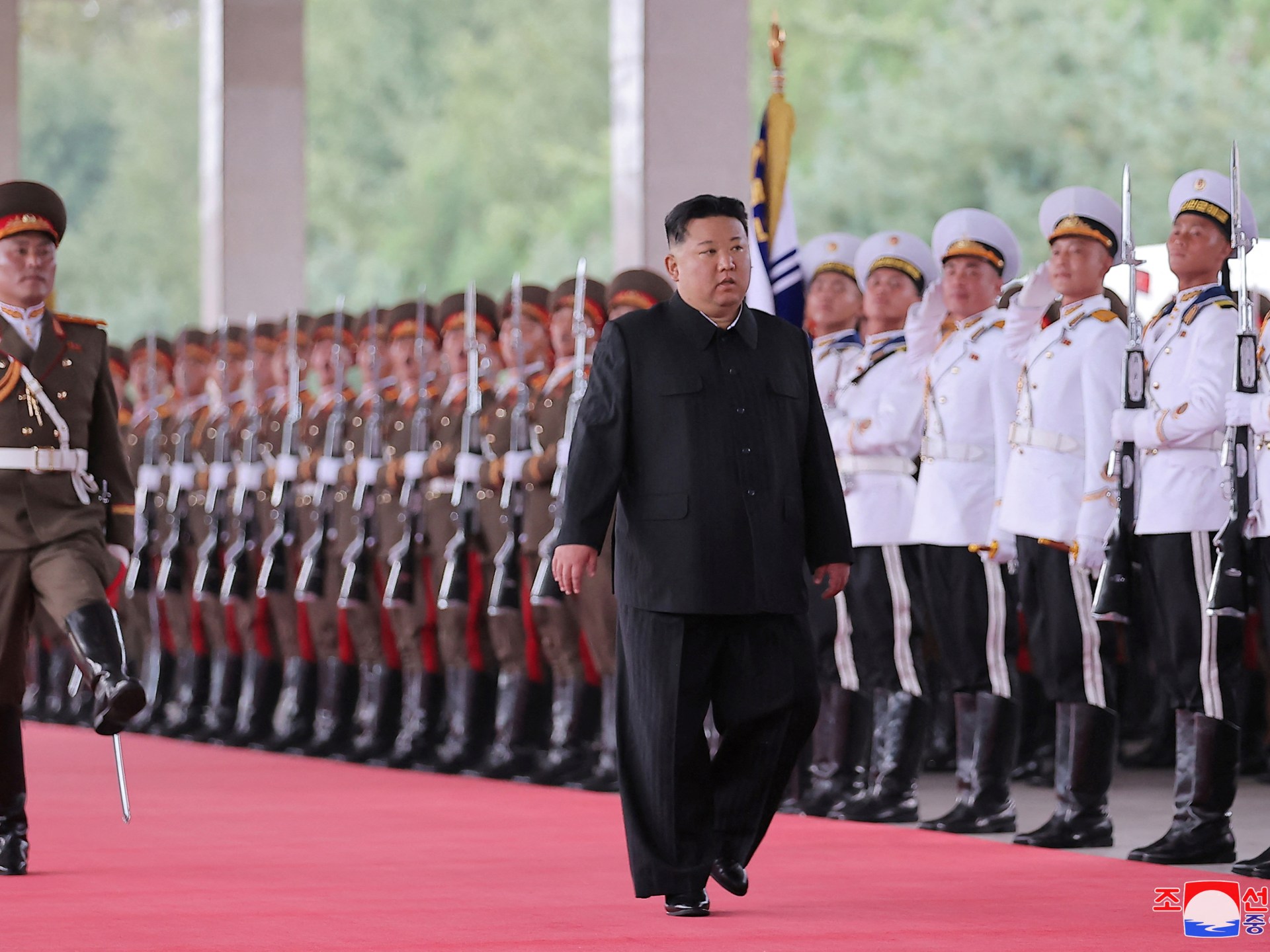North Korean leader Kim Jong Un and Russian President Vladimir Putin held their first-ever summit in 2019.
Kim travelled to Vladivostok in his armoured train where the men spent two days enjoying folk dances, feasting on borscht and reindeer dumplings, and toasting the burgeoning relationship between their two countries.
At that time, broadly supportive of the United Nations sanctions imposed on Pyongyang over its weapons programme, Putin promised to do what he could with China and the United States to break the impasse in denuclearisation talks.
Four years later, Kim and Putin are due to meet again.
This time, however, it is all about arms sales and technology transfer.
“It’s a new and terrifying world we are entering,” In-bum Chun, a retired Lieutenant General in the South Korean army and an expert on North Korea’s military and politics, told Al Jazeera. “Putin will receive weapons and North Korea, [the] technology to improve its nuclear weapons’ capabilities.”
A big reason for the change is Moscow’s full-scale invasion of Ukraine in February 2022.

Moscow had hoped for a swift end to the conflict but the fighting has dragged on for more than 18 months.
And Russia is now not only far more isolated on the world stage than it was in 2019, but also the target of sanctions.
“This is a war of attrition,” said Mason Richey, an associate professor of international politics at Hankuk University for Foreign Studies in the South Korean capital Seoul.
“We think of this as a war of people but that’s where Russia has a relative advantage. Where Ukraine has an advantage is in ‘metal’ – the military assets. It can count on support from the US and Europe. They’ve gone chips all in on supporting Ukraine.”
According to the Royal United Services Institute, a London-based think tank, Russia used some 12 million shells in Ukraine in 2022 and is expected to use some 7 million this year. Its munitions factories have the capacity to produce just 2.5 million shells a year.
Given sanctions imposed on Moscow and the consequences of breaching them, “Russia’s search for ammunition partners has turned up a hodgepodge of aggrieved, ambitious and opportunistic nations,” Matthew Sussex, an expert in Russian foreign policy at the Australian National University, wrote in The Conversation on September 10.
While North Korea has spent much of the recent past testing out the new weapons and military equipment it is developing to modernise its military, the country still has plenty of “metal” – from shells to ammunition – and the ability to produce it in large quantities.
Bruce Bechtol, a professor in politics at Angelo State University in the US who has published books on the North Korean regime and its military proliferation, says Kim would probably be able to offer Russia 152mm artillery guns and different kinds of multiple rocket launchers, as well as small arms such as the Type 73 light machine gun, AK-47 assault rifle and the ammunition necessary for such systems.
“There is no doubt that North Korea is very good at producing Soviet-designed systems of older design and turning them out rather quickly,” Bechtol told Al Jazeera.
Chun agrees Pyongyang has a “full range of conventional weapons” on offer as well as drones, portable shoulder-fired missiles (MANPADS), and “a very capable anti-tank system called the Bulsae, which is similar to the Russian Kornet”.
North Korea could even send soldiers, he added.
And while the US, which first indicated last year that North Korea was prepared to send arms to Russia, has said Russia’s purchase of such weapons is a sign of desperation, analysts are not so sure.
“North Korean weapons are reliable and inexpensive,” Chun said. “North Korea is also willing to sell. Why wouldn’t the Russians buy from them.”
Moscow and Pyongyang have maintained close ties since Soviet times – hence the older and compatible military hardware – but have moved closer since the start of the Ukraine invasion.
But analysts point out that while Pyongyang once saw the Moscow relationship as largely transactional – useful for its leverage on China, its main ally – that is now changing.
North Korea has emerged as one of the few emphatic supporters of the Russian invasion. It backed Moscow at the UN in March 2022, weeks after the invasion, and a few months later recognised the so-called Donetsk People’s Republic and Luhansk People’s Republic in partly-occupied eastern Ukraine as independent states.
Moscow has also appeared to be more supportive of North Korea in the UN, preventing any action on Pyongyang’s missile tests despite serial sanctions violations.
In July, Defence Minister Sergei Shoigu visited Pyongyang. The guest of honour at the Victory Day celebrations in Pyongyang, Shoigu was the first Russian defence minister to visit the country since the collapse of the Soviet Union in 1991.
Shoigu stood next to Kim to watch the military parade through Kim Il Sung Square, the North Korean leader was also pictured showing Shoigu around a defence exhibition showcasing North Korea’s latest weaponry, including banned ballistic missiles.
Writing to Putin in August, when Pyongyang commemorates the end of Japanese colonialism in the Korean Peninsula, Kim said Russia and North Korea’s friendship had been forged with the victory over Japan in World War II, and called for the further development of a “a long-standing strategic partnership … with the demand(s) of the new era”.
Putin told Kim, meanwhile, that he expected the two countries would “strengthen bilateral cooperation in all fields”.
‘Biggest enabler’
The question for many is the price that Russia, a permanent veto-holding member of the Security Council, would be willing to pay for the weaponry.
The COVID-19 pandemic has exacerbated the problems facing the North Korean economy but as he sits down with Putin, Kim’s focus is likely to be on the military and his ongoing plan to develop new weapons and equipment.
“It’s Kim’s best chance in a long time to get some assistance from the Russians,” Robert Kelly told Al Jazeera. “Putin’s in a tight spot. He needs this stuff.”

North Korea, which the UN has accused of letting its people suffer while it develops its military might, will probably demand food or energy aid in exchange for the arms.
But most analysts expect Kim to push Putin to share key military technology, including for Russia’s nuclear-powered submarines.
Some already suspect Russian involvement – whether through technical assistance or proliferation – in recent North Korean weapons. Bechtol points to the new weapons’ similarities with Russia’s Iskander missile and its newfound capabilities in hypersonic missile technology.
“All in all, Russia may be the biggest enabler of North Korea today, even more so than China,” wrote Victor Cha and Ellen Kim of the Washington, DC-based think tank the Center for Strategic and International Studies, in a commentary on September 6.
“The latter has not been supportive of the denuclearization agenda and has not helped to bring Pyongyang back to the negotiating table, given the state of U.S.-China relations. But Beijing reportedly has been opposed to North Korea conducting a seventh nuclear test. This stands in contrast to potential arms and missile deals being negotiated by Moscow that could accelerate North Korea’s military satellite, nuclear submarine and ICBM (intercontinental ballistic missile) programs.”
The US said last week that North Korea would “pay a price” for selling arms to Moscow but with Pyongyang sanctioned to the hilt, it seems there are few real options for Washington to increase pressure on Pyongyang.
Kim, meanwhile, will be looking at his wish list of weaponry and hoping his friends in Moscow will provide him with the assistance he needs to ensure his military dreams move closer to reality.
The security ramifications of the two men’s latest meeting in Vladivostok are likely to be felt far beyond Ukraine.
